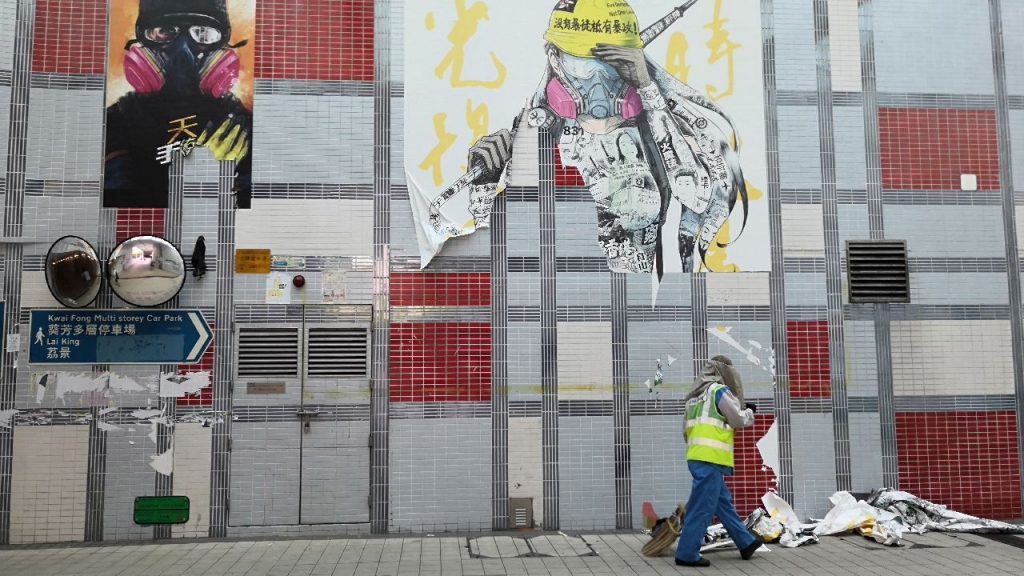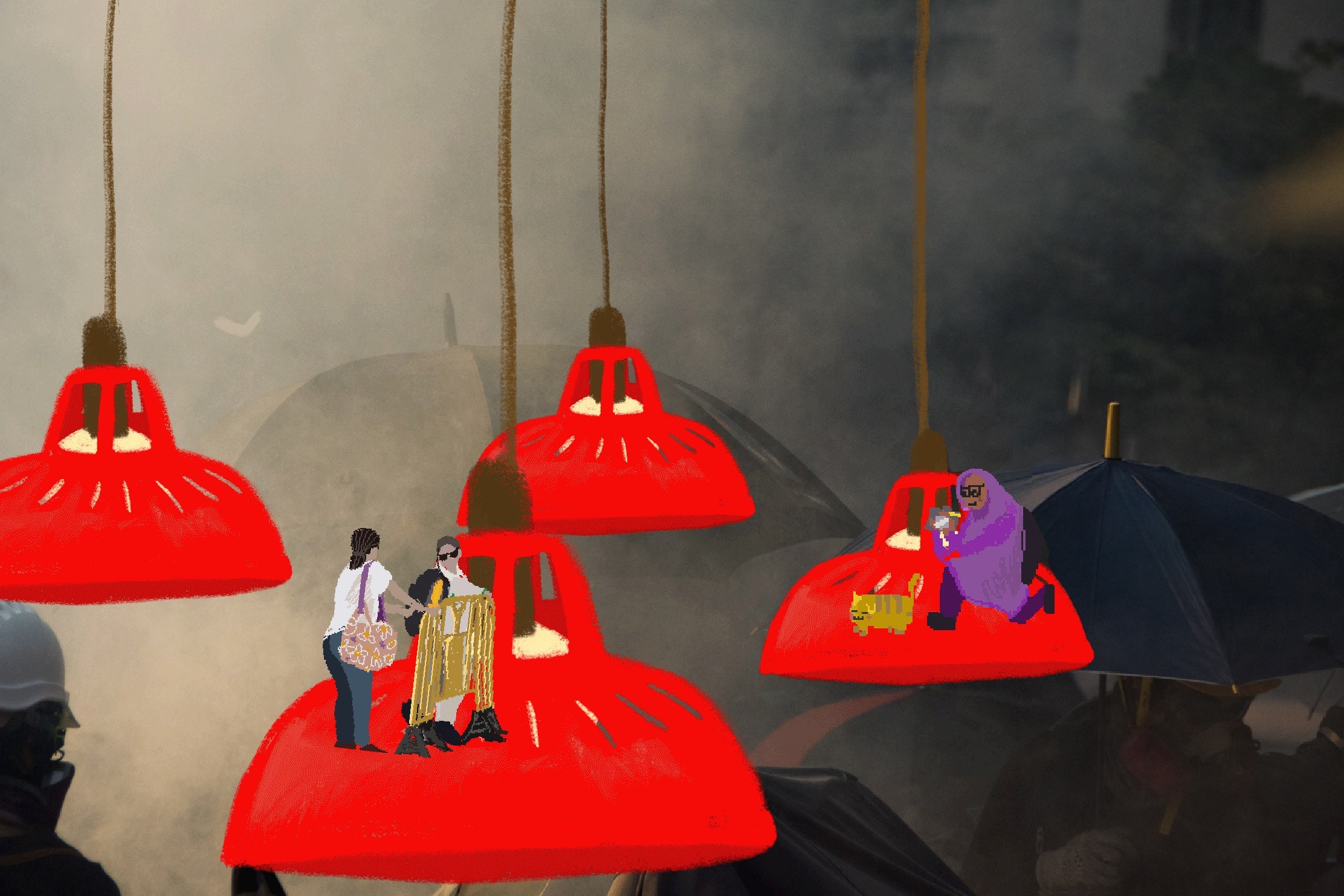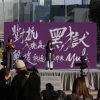Originally published in 闹清楚 naoqingchu. Republished with permission. This interview has been condensed and edited for clarity. Read the interview in Bahasa Indonesia and Chinese.
All graphics by spf.pdf.
On March 1, 2020, Indonesian migrant domestic worker (MDW), writer and journalist Yuli Riswati talked to Ralf Ruckus and Alina Kornfeldt about MDWs’ visible and invisible involvement in the Hong Kong anti-establishment struggle. While their labor has sustained the momentum of the movement, let alone the functions of everyday life in the city, their concerns have gone largely neglected in its demands for democracy.

Hiring a domestic worker may be a status symbol in many cities, but in Hong Kong, it is often a necessity rather than a luxury. One in eight families and one in three families with children employ a domestic worker to take care of the young, the elderly, and everyday domestic needs. Most households rely on a double income in order to cover their living costs; after all, Hong Kong is the most expensive city in the world to rent an apartment. Hong Kong workers already have notoriously long working days, but there is also a lack of affordable care facilities for children and the elderly. For working-class families, employing an MDW is thus often the most economical solution to their care needs. MDWs make sure their employers can go to work with clean and presentable clothing, keep their house safe and well-maintained, look after their children and elderly parents. In other words, they keep life moving in Hong Kong.
However, immigration regulations and labor policies have long belied the crucial role MDWs play in society. In the 1970s, the government introduced a visa scheme that has since effectively legalized an exploitative framework for MDWs’ living and working conditions. It stipulates that MDWs live with their employers as well as exempt their fixed monthly salary from the statutory minimum wage. They are entitled to one rest day per week, but otherwise, their working hours are not regulated. Their visa depends on a contract with an employer, and if the domestic worker in question or the employer terminates the contract, the worker has to find a new employer within two weeks or face deportation.
In Hong Kong, the 150,000 domestic workers from Indonesia form the second largest group of MDWs. They organize themselves, hold demonstrations and protests, and make demands to the Hong Kong and Indonesian governments. The Indonesian government, however, has discouraged MDWs from political involvement. Indonesia depends on the remittances sent home by Indonesians working abroad; in fact, these funds have become the second largest source of foreign income after the export of crude oil and gas.
In June 2019, the drafting of an extradition bill triggered protests that have since been supported by large parts of Hong Kong society. Yuli Riswati observed and covered the protests between June and October 2019. Since 2017, she had been offering counseling to her fellow MDWs on social media. In March 2019, she launched the website Migran Pos, a not-for-profit news outlet that publishes crucial updates for the Indonesian community. During the course of the Hong Kong movement, MDWs have relied on Migran Pos as a trusted source of information about the protests.
In early December 2019, Yuli was deported by Hong Kong immigration authorities. Accused of overstaying her visa, she was arrested in her flat in September and detained for 28 days in November, where she faced humiliating and dehumanizing treatment. After her deportation, Hong Kong-based groups organized a solidarity rally that also addressed the situation of inmates in detention centers in Hong Kong.

Invisible forms of support
Ralf Ruckus/Alina Kornfeldt: How have MDWs been involved in the protests?
Yuli Riswati: MDWs who have an understanding of democracy support the protests, but they don’t openly participate in the movement because the risks would be too high for them. They fear that participating in the movement would lead to discrimination, deportation, and bans on working in Hong Kong. The majority of MDWs does not have any deeper knowledge of politics or an understanding of what is happening in Hong Kong.
I have talked to workers who contribute to the movement on their workdays to ensure the wellbeing of their employers who join the protests: they prepare food to bring to the demonstrations and equipment like umbrellas as protection against photo-taking and rubber bullets. They remind their employers and family members to bring masks or pack spare clothes to bring to the actions. For example, once at the market, I met an MDW who was carrying five or six umbrellas.
I asked her, “You went out to buy umbrellas? Why so many?”
She replied, “Yes, I bought them for my employer. We have run out of umbrellas in the house.”
“Really, how could they run out of umbrellas?”
“They take them to the rallies. I am getting these umbrellas for them, my employer and his children.”
“All of them are joining the demonstrations?”
“Yes, my male employer, his daughter, and her two children: all of them go onto the streets. And each of them brings an umbrella. So I bought these for them.” She added, “The shopkeeper also asked me why I was buying so many umbrellas. He is an elderly pro-establishment man. I said I want to send them to my home country because umbrellas in Hong Kong are of good quality.”
A small proportion of workers was directly involved in the actions explicitly in their capacity as domestic workers. One worker told me about her 70-year-old employer who wanted to support the young people on the streets. However, she had no one to go with because her husband was ill and had to walk with crutches.
The old woman said to their domestic worker, “I would like to take part in the actions, but I can’t go there with my husband because he is not mobile. Joining my son is not an option either because he will be on the frontlines. He will have to run when the protesters clash with the police.”
The worker replied, “If you need someone to accompany you, I can accompany you.”
“But that means you won’t be able to take your day off.”
“I don’t mind accompanying you; what matters is that you are happy. You are good to me.”
So the domestic worker accompanied her employer almost every time she joined the actions. She sacrificed her day off, but her employer was also good to her; of course, she was compensated for working on her day off. There was a mutual understanding between the two. The worker carried food and drinks for her elderly employer who couldn’t carry big bags any more. She made sure her employer would reach the demonstration and then get home safely. They had to walk long distances. When her employer was exhausted, the domestic worker would ask her to take a rest or have something to eat.
I asked this worker, “Do you actually intend to help the movement?”
“Well, no. What matters to me is helping my employer. I know that she is fighting for many things, so I want to help her.”
Apart from supporting the movement through ensuring their employers’ physical wellbeing, they also gave them mental support. For instance, they comforted their employers when they fought with their children who had been participating in the demonstrations. I talked to workers whose employers had kicked their children out of the house.
These employers said to their children, “If you get in trouble, don’t drag us into it,” or, “You are not my son anymore.”
These young people did not come home for a couple of months and did not tell their parents where they were staying, but made sure their parents were well via the domestic workers. These workers therefore tacitly took up the role of mediator, bridging communication between estranged parent and child. When these adolescents chose to leave their homes, they actually did not have the heart to do so.
They contacted the domestic worker when they wanted to ask about their parents’ well-being, but did not want to call them directly, “How is Mom? Is she taking her medicine regularly? You have to take good care of her.”
The worker thus became emotionally involved. Her support and reassurance allowed the demonstrators to focus on the protests and not worry about their families at home.
Conversely, employers also asked domestic workers to be messengers to communicate with their children. In one case, the conflict between a mother and her sons had gotten so ugly that they would not even greet each other, but this employer would sometimes buy her sons’ favorite food and send it to them via the domestic worker.
“Give this to gogo (elder brother) and sailou (younger brother). I’m sure they don’t get this where they are.”
Then, the domestic worker would contact her employers’ sons and ask, “Where are you? I will bring you soup.”

Silent treatment in the movement
RR/AK: Do you feel MDWs’ contributions to the movement have been appreciated?
YR: Despite our contributions, we experience unequal treatment because we do not have adequate access to information and protection. In the beginning, neither the government nor Hongkongers themselves thought that we were part of their lives and that we needed to be informed about what is happening.
In fact, without necessarily being aware of it, MDWs have been involved in the movement. It may just happen that workers get hurt from rubber bullets or tear gas when they are out. But our contracts also state that our health insurance cannot cover the treatment of injuries we sustain on our days off. So, exercising our right to spend our days off outside comes with a high risk. Who is looking out for our safety? If we are not protected, this means we are deprived of our right to enjoy our day off once a week, whether we are directly involved in the movement or not.
Neither the government of Hong Kong, the government of Indonesia, nor Hong Kong people feel that we have our own political views. Therefore, they do not include us. Why are we always treated like children and dictated toward regarding how to behave and which attitudes we should cultivate? If we had more access to information, we could develop our own attitude toward the movement. How we think about the movement should be our decision as grown-up human beings. We are expected to complete only certain tasks and abide by other people’s opinions and decisions, never to speak for ourselves nor decide for ourselves which position we want to take up. They really discriminate against us in this respect.
So far, we have been restrained from taking action and raising our voices as if we were different to the locals, or Hongkongers, or whatever you want to call them. To me, the question is: Who should be called a Hongkonger?
They are the Hong Kong government, the locals, the Indonesian government, and even a great portion of our own community. In fact, some have internalized this discrimination: we are only women and should only do our job as domestic workers, obey our employers, and listen to the appeals of the government. And when someone dares to have a different opinion, they would think she has caused harm to the community and bully her into submission, no longer treating her as one of us.
My personal opinion is that everyone should be aware that migrant workers are equal to everyone else in Hong Kong. Irrespective of their legal status, MDWs are humans like everybody else, grown-ups who make their own choices and who are capable of forming their own views on the movement. But so far, we have been restrained from taking action and raising our voices as if we were different to the locals, or Hongkongers, or whatever you want to call them. To me, the question is: Who should be called a Hongkonger? We may be involved in many ways, voluntarily or by exploitation, because of our job or by personal choice. But in the end, whether you call us Hongkongers or not, we are part of Hong Kong.
RR/AK: When you collected information and took photos during the demonstrations, what kind of reactions from protesters did you encounter?
YR: Sometimes I was met with suspicion because my appearance tends to stand out; I wear a hijab and my clothes are of a different color than those of typical protesters.
Once I was taking pictures among a bunch of journalists. Someone suddenly approached me and asked, “Are you a journalist?”
I showed them a press card, which we had made at Migran Pos. That was enough for him to say, “Okay. If you are a journalist, I won’t disturb you.”
On another occasion, when I was taking photos, some women said, “Hey, you can’t randomly take photos.” Suddenly they all started to insult me.
I explained, “I know, I don’t take any pictures that show faces and I am aware of what I can take a picture of and what I cannot.” I showed them my camera.
I experienced these moments of suspicion because I look different. I got the feeling that there was a bias, that they felt I am not their equal, that they felt disturbed because someone who is so different from them was in the thick of these protests, just the way they were.
I faced rejection not only from pro-democracy protesters but also from people who support the government. Once, when I was collecting information on the protests in Admiralty, a business district in Hong Kong, an elderly lady came over to me, “Why are you taking photos of the police? They are doing their work.” She hit me.
I said to her, “You are not allowed to hit me.”
Many people then came over to protect me, “You may not hit her. If you hit her, you could be reported to the police.”
“She is a maid. What is she doing here?”
Not everybody in the movement rejected us, however. Most of the protesters weren’t bothered by our presence. The younger protesters were more welcoming. Some of them really cared about us. I was sitting among the protesters in a shopping mall once when the police came. All of a sudden someone opened an umbrella above my head. I turned around.
He said, “You have to use an umbrella because the police are upstairs. They are filming us. I don’t want them to film you. You better put on your mask.”
Another time, I was reporting on a protest in Sham Shui Po. In the metro station, I was taking pictures of food and spare clothes that supporters had left for the protesters on the ticket machine. Suddenly, the protesters came running.
Some of them stopped and said to me, “Jeje (elder sister, form of address used for MDWs in Cantonese), you should leave this place, it is dangerous here. Come with us, we are taking the metro.” I was moved by these protesters who took care to protect us when they themselves were in danger.
In another situation, I witnessed how a domestic worker was trapped in the protest area. She was crying in fear.
One of the young protesters asked her, “What are you doing?”
“I want to go home. My employer’s home is over there, but I am scared.”
This young guy took off his helmet and put it on her head while his friend shielded her with an umbrella. The two of them accompanied her past the crowded area. I was speechless when I observed this scene. I couldn’t even take any photos because I was so moved. They cared about us when we needed to be protected even though we were not involved.
Some protesters would also say to the domestic workers, “Sorry, jeje, we have to pass here. Sorry to disturb you.”

Asymmetries of justice and participation
RR/AK: From your perspective as an MDW, which demands should be added to the five demands of the movement?
YR: MDWs are not represented in these demands, but the extradition bill also affected us because it would have applied to everyone who is in Hong Kong. The demand for suffrage, meanwhile, would not apply to us because we are not citizens. I don’t know whether I have the right to say this, but if something should be added to the demands, it would be a demand on behalf of the rights of MDWs and other ethnic minorities in Hong Kong. That would mean putting a stop to discrimination and providing equal access to information.
There is an asymmetry between Hong Kong citizens, ethnic minorities and MDWs. Discrimination and everyday racism have always been a fact of our lives. Yet, fulfilling the demand for equality does not solely rest with the government. This is also the responsibility of Hong Kong citizens. We support their movement because we feel that we are a part of this community even if not all of their demands include us. We extend solidarity because we know that if Hongkongers lose their freedom of expression, so will we.
I think a common movement that includes ethnic minorities and MDWs from the grassroots would overcome the gap between the demand for justice, discrimination of non-citizens and ignorance toward people who actually live amongst those who have rallied on the streets.
In my opinion, regardless of its aims, the movement would strengthen if it addressed the question of exclusion. The slogan “we connect”, which had first appeared in October 2019 due to ongoing conflict that also affected ethnic minorities, raised the broader question of ethnic minority relations in Hong Kong. Rumors had been scapegoating members of Southeast Asian communities for an attack against a pro-democracy activist. Both Muslim and non-Muslim communities were also alarmed when police water cannons blasted the biggest mosque in Hong Kong with stinging blue dye in a dispersal operation.
I think a common movement that includes ethnic minorities and MDWs from the grassroots would overcome the gap between the demand for justice, discrimination of non-citizens and ignorance toward people who actually live amongst those who have rallied on the streets. If you want your movement to be successful, don’t disregard that MDWs contribute to the persistence of the movement: We take care of everything in your homes and make sure that your families are well. Don’t forget that we could just say that this is not our job: our duties include doing household chores, not establishing emotional bonds with you. But the fact remains that you need more from the MDWs. This is why Hongkongers should involve us and other ethnic minorities. They should stop thinking it’s only them who know best about Hong Kong.

Shared struggle between Hong Kong and Indonesia
RR/AK: Last year in September and October, Indonesia saw the largest protests in decades in reaction to legislative proposals that would curb the powers of Indonesia’s anti-corruption body and freedom of expression, limit personal freedoms and harm the environment. How did these protests relate to the Hong Kong protests?
YR: The massive movement in Hong Kong has inspired recent protests in Indonesia. Since the 1998 protests and the fall of the Suharto regime, no massive protests have occurred in Indonesia. It seemed that Indonesians have felt comfortable with the reformasi period, the transitional era that followed the resignation of the authoritarian president Suharto who had ruled the country for 32 years.
Actually, there are many issues Indonesians have been dissatisfied with. They have just been waiting to raise their voice. What happened in Hong Kong inspired Indonesians and gave them motivation: “In Hong Kong, the young people have already gone to the streets.” But the movement in Hong Kong was also inspired by previous movements in Indonesia. They found that Suharto and Carrie Lam had something in common, since both leaders refused to step down and were ready to do anything to retain power. On July 1, protesters in Hong Kong stormed the Legislative Council complex for the first time in history. Some tweeted that they had been inspired by the 1998 movement, where demonstrators occupied the National Parliament building in Jakarta, leading to the end of Suharto’s autocratic rule.
What happened in Hong Kong inspired Indonesians and gave them motivation. But the movement in Hong Kong was also inspired by previous movements in Indonesia.
From Molotov cocktails to burning tires, both movements have inspired each other in their tactics. They share the struggle against tyranny and the demand of democracy.
In September 2019, when people in Jakarta protested against the government, the hashtag “reformasi dikorupsi“ (the reformasi movement has been corrupted) started to appear in Hong Kong. I once took a photo of some graffiti of ‘reformasi dikorupsi’. I was sure that Hongkongers who don’t speak Indonesian, or non-Indonesians, had been behind this graffiti because it contained misspellings and it seemed that some text was crossed out.
Also, I once overheard a discussion among some demonstrators, “It’s a pity what is happening in Indonesia. Some people were shot. They died.” They felt a connection to what was happening in Indonesia although they were also facing repression themselves.
They cared for Indonesians, and Indonesians cared for Hongkongers. Both communities faced arbitrary violence from corrupt governments and ruthless police. An emotional bond began to form between both movements although they do not directly relate to each other. While there had been no explicit solidarity movement with Hongkongers in Indonesia, I did see messages of solidarity with Indonesia in Hong Kong: “Stay with Indonesia.”
I met a protester once who said he felt sympathetic for Indonesians suffering under an inept government.
“How do you know about Indonesia?”
“I read everything, jeje. I learn about Indonesian history. Now that we can look up all this information on the Internet, I read all about Suharto’s fall.”

Solidarity with migrant domestic workers
RR/AK: When you were deported, some activists in Hong Kong organized a solidarity action. Who supported you?
YR: Among the supporters were local and internationalist journalists, some local individuals, some refugees, and people engaging in the field of migrant workers, such as members of collectives, or the members of the Hong Kong Federation of Asian Domestic Workers Unions. Some supporters were from Lensational, an organization that supports female workers in places like Hong Kong, India, and Pakistan by teaching photography; I had been active as a student and tutor there.
Some of the participants really surprised me. A friend of mine sent a video of a 12-year-old kid who had joined the action.
“Why are you coming to this solidarity action?”
“I want to support Yuli because I also have a jeje at home. The jejes are very good to us.”
“And why are you wearing a mask?”
“Because I don’t want my parents to know. They don’t support the demonstrations.”
RR/AK: In what way was the Justice for Yuli action different from earlier solidarity actions with MDWs, for instance the solidarity actions with Erwiana, a domestic worker who was tortured by her employer and whose case has triggered public discussions about migrant workers in Hong Kong in 2015?
YR: The solidarity action Justice for Yuli questioned MDWs’ exclusion from the identity of being a Hongkonger. The organizers came up with the idea that the designation “foreign domestic worker”, which is common in Hong Kong, should be changed into “migrant domestic worker.” They had questioned the designation of MDWs as foreigners: “Isn’t it unfair to consider them foreigners while they are actually a part of us?” The action stimulated discussions among supporters: How should we treat domestic workers in the future?
As a result of the action, the solidarity movement in Hong Kong started to engage in advocacy for the rights of refugees and detainees in the Castle Peak Bay Immigration Centre (CIC), where deportees are held prior to deportation. To secure detainees’ access to justice, a group of supporters called the CIC Detention Rights Concern Group, for example, has been contesting the government in relation to some claims of illegal detention. My case has revealed a lot of mistreatment at the detention center, and more ex-detainees have started to share their experiences.
Other contributions by Yuli Riswati
Afterwork (KUNCI & Parasite 2016), an anthology that contains one of Yuli Riswati’s short stories.
Yuli’s speech at the international women’s day demonstration in Berlin on March 8, 2020
Yuli’s contribution to the exhibition, afterbefore: images and sounds from hong kong, an exhibition of photography, video, sound art, and the written word at The Gallery at Chinatown Soup, New York, January 29 to February 9, 2020.









